James Bryce, 1st Viscount Bryce
James Bryce, 1st Viscount Bryce, OM, GCVO, PC, FRS, FBA (10 May 1838 – 22 January 1922) was an Irish-born academic, jurist, historian, and Liberal politician.[1]
The Viscount Bryce | |
|---|---|
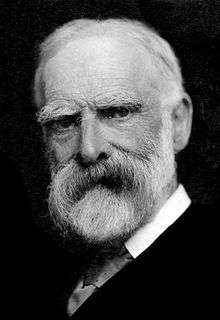 1st Viscount Bryce in 1902 | |
| British Ambassador to the United States | |
| In office 1907–1913 | |
| Monarch | Edward VII George V |
| President | Theodore Roosevelt William Howard Taft |
| Prime Minister | Sir Henry Campbell-Bannerman H. H. Asquith |
| Preceded by | Sir Henry Mortimer Durand |
| Succeeded by | Sir Cecil Spring Rice |
| Chief Secretary for Ireland | |
| In office 10 December 1905 – 23 January 1907 | |
| Monarch | Edward VII |
| Prime Minister | Sir Henry Campbell-Bannerman |
| Preceded by | Walter Long |
| Succeeded by | Augustine Birrell |
| President of the Board of Trade | |
| In office 28 May 1894 – 21 June 1895 | |
| Monarch | Victoria |
| Prime Minister | The Earl of Rosebery |
| Preceded by | A. J. Mundella |
| Succeeded by | Charles Thomson Ritchie |
| Chancellor of the Duchy of Lancaster | |
| In office 18 August 1892 – 28 May 1894 | |
| Monarch | Victoria |
| Prime Minister | William Ewart Gladstone |
| Preceded by | The Duke of Rutland |
| Succeeded by | The Lord Tweedmouth |
| Under-Secretary of State for Foreign Affairs | |
| In office 7 February 1886 – 20 July 1886 | |
| Monarch | Victoria |
| Prime Minister | Gladstone |
| Preceded by | Hon. Robert Bourke |
| Succeeded by | Sir James Fergusson, Bt |
| Personal details | |
| Born | 10 May 1838 Belfast, Ireland |
| Died | 22 January 1922 (aged 83) Sidmouth, Devon, South West England |
| Political party | Liberal |
| Alma mater | University of Glasgow, University of Oxford |
| Occupation | Politician |
| Profession | Academic |
| Signature | |
Background and education
Bryce was born in Arthur Street in Belfast, County Antrim, in Ulster, Ireland, the son of Margaret, daughter of James Young of Whiteabbey, and James Bryce, LLD, from near Coleraine, County Londonderry. The first eight years of his life were spent residing at his grandfather's Whiteabbey residence, often playing for hours on the tranquil picturesque shoreline. John Annan Bryce was his younger brother.[2] He was educated under his uncle Reuben John Bryce at the Belfast Academy,[3] Glasgow High School, the University of Glasgow, the University of Heidelberg and Trinity College, Oxford.
He was elected a fellow of Oriel College, Oxford, in 1862 and was called to the Bar, Lincoln's Inn, in 1867.[2] His days as a student at the University of Heidelberg gave him a long-life admiration of German historical and legal scholarship. He became a believer in "Teutonic freedom", an ill-defined concept that was held to bind the German Empire, Britain and the United States together. For him, the United States, the British Empire and Germany were "natural friends".[4]
Academic career
Bryce went to the bar and practised in London for a few years[5] but was soon called back to Oxford as Regius Professor of Civil Law, a position he held between 1870 and 1893. From 1870 to 1875, he was also Professor of Jurisprudence at Owens College, Manchester.[2] His reputation as an historian had been made as early as 1864 by his work on the Holy Roman Empire.[6]
In 1872, he travelled to Iceland to see the land of the Icelandic sagas as he was a great admirer of Njáls saga. In 1876, he ventured through Russia to Mount Ararat, climbed above the tree line and found a piece of hand-hewn timber, 4 feet (1.2 m) long and 5 inches (13 cm) thick. He agreed that the evidence fit the Armenian church's belief that it was from Noah's Ark and out of respect, he offered no other explanations.[5]
Member of Parliament
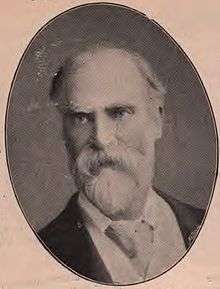
.jpg)
Bryce was an ardent Liberal in politics and, in 1880, he was elected to parliament for the Tower Hamlets constituency in London.[2] In 1885, he was returned for South Aberdeen and was re-elected there on succeeding occasions. He remained a Member of Parliament until 1907.[2][7]
Bryce's intellectual distinction and political industry made him a valuable member of the Liberal Party. As early as the late 1860s, he acted as Chairman of the Royal Commission on Secondary Education. In 1885, he was made Under-Secretary of State for Foreign Affairs under William Ewart Gladstone but had to leave office after the electoral defeat that same year. In 1892, he joined Gladstone's last cabinet as Chancellor of the Duchy of Lancaster[8] and was sworn of the Privy Council at the same time.[9]
In 1894, he was appointed President of the Board of Trade in the new cabinet of Lord Rosebery,[10] but had to leave this office with that whole Liberal cabinet only the next year.[2]
The Liberals were to remain out of office for the next ten years. In 1897, after a visit to South Africa, Bryce published a volume of Impressions of that country, which had considerable weight in Liberal circles when the Second Boer War was being discussed. In his book, he devoted significant sections to the recent history of South Africa, various social and economic details about the country, and his experiences while travelling with his party.
The "still radical" Bryce was made Chief Secretary for Ireland in Prime Minister Sir Henry Campbell-Bannerman's cabinet in 1905 and remained there throughout 1906.[2][11] In his approach to domestic politics, Bryce was critical of many of the Liberal Government's social reforms, including old-age pensions, the Trade Disputes Act, and the redistributive "People's Budget," which he regarded as unwarranted concessions to socialism.[12]
Ambassador to the United States
_beside_Prince_Arthur_in_top_hat._1911_copyright_Library_of_Congress_(2).jpg)
However, even this time, Bryce's cabinet post was held only for a brief period because as soon as February 1907, he was appointed British Ambassador to the United States of America.[13] He kept this diplomatic office until 1913 and was very efficient in strengthening Anglo-American ties and friendship. Bryce made many personal friends in American politics such as US President Theodore Roosevelt. The German ambassador in Washington, Graf Heinrich von Bernstorff, later admitted how relieved he felt that Bryce was not his competitor for American sympathies during the World War period even though Bernstorff managed to keep the US from declaring war until 1917.
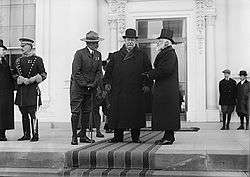
As an author, Bryce quickly became well known in America for his 1888 work, The American Commonwealth. The book thoroughly examined the institutions of the United States from the point of view of a historian and constitutional lawyer and at once became a classic. In developing material for his book, Bryce painstakingly reproduced the travels of Alexis de Tocqueville, who wrote Democracy in America (1835–40). Although Tocqueville emphasized the egalitarian nature of early-19th-century America, Bryce was dismayed to find vast inequality: "Sixty years ago, there were no great fortunes in America, few large fortunes, no poverty. Now there is some poverty... and a greater number of gigantic fortunes than in any other country of the world"[14] and "As respects education... the profusion of…elementary schools tends to raise the mass to a higher point than in Europe... [but] there is an increasing class that has studied at the best universities. It appears that equality has diminished [in this regard] and will diminish further."[15] The work was heavily used in academia as a result of Bryce's close friendships with men such as President James B. Angell of the University of Michigan and successively Charles W. Eliot and Abbott Lawrence Lowell at Harvard.[16] The work also became a key medium for certain Americans to popularise the view of American history as distinctly Anglo-Saxon.[17]
Peerage
After his retirement as ambassador and his return to Great Britain, he was raised to the peerage as Viscount Bryce, of Dechmount in the County of Lanark, in 1914.[18] Thus, he became a member of the House of Lords, the powers of which had been curtailed by the Parliament Act 1911.
First World War
Following the outbreak of the First World War, Bryce was commissioned by Prime Minister H. H. Asquith to give the official Bryce Report on alleged German atrocities in Belgium. The report was published in 1915 and was damning of German behaviour against civilians.
Bryce's accounts were confirmed by Vernon Lyman Kellogg, director of the American Commission for Relief in Belgium, who told the New York Times that the German military enslaved hundreds of thousands of Belgian workers and abused and maimed many of them in the process. Bryce also strongly condemned the Armenian Genocide in the Ottoman Empire, mainly in the year 1915. Bryce was the first to speak on that subject in the House of Lords, in July 1915. Later, with the assistance of the historian Arnold J. Toynbee, he produced a documentary record of the massacres, published by the British government in 1916 as the Blue Book. In 1921, Bryce wrote that the Armenian genocide had also claimed half of the population of Assyrians in the Ottoman Empire and that similar cruelties were perpetrated upon them.[19][20]
Later life
During the last years of his life, Bryce served at the International Court at The Hague, supported the establishment of the League of Nations and published a book, Modern Democracy, in 1921 which was rather critical of post-war democracy.
Honours and other public appointments
Bryce received numerous academic honours from home and foreign universities. In September 1901, he received the degree of Doctor of Laws from Dartmouth College,[21] and in October 1902 he received an honorary degree (LLD) from the University of St Andrews.[22] He became a fellow of the Royal Society in 1894.[23]
In earlier life, he was a notable mountain climber, ascending Mount Ararat in 1876, and published a volume on Transcaucasia and Ararat in 1877; in 1899 to 1901, he was the president of the Alpine Club. From his Caucasian journey, he brought back a deep distrust of Ottoman rule in Asia Minor and a distinct sympathy for the Armenian people.[24]
In 1882, Bryce established the National Liberal Club, whose members, in its first three decades, included fellow founder Prime Minister Gladstone, George Bernard Shaw, David Lloyd George, H. H. Asquith and many other prominent Liberal candidates and MP's such as Winston Churchill and Bertrand Russell.[25][26] In April 1882 Bryce was elected a member of the American Antiquarian Society.[27]
In 1907, he was made a Member of the Order of Merit by King Edward VII.[28] At the King's death, Bryce arranged his Washington Memorial Service.[29] At the time of Bryce's memorial service at Westminster Abbey, his wife, Elizabeth, received condolences from King George V, who "regarded Lord Bryce as an old friend and trusted counsellor to whom I could always turn."[30][31] Queen Victoria had said that Bryce was "one of the best informed men on all subjects I have ever met".[32][33]
From 1907 through 1908, Bryce served as the president of the American Political Science Association. He was the fourth person to hold this office.[34]He was president of the British Academy from 1913 to 1917.[2] In 2013, the Ulster History Circle unveiled a blue plaque dedicated to him, near his birthplace in Belfast.
Personal life
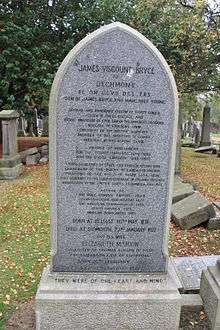
Bryce married Elizabeth Marion, daughter of Thomas Ashton and sister of Lord Ashton, 1st Baron Ashton of Hyde in 1889. They had no children.[35]
Bryce died on 22 January 1922, aged 83, in Sidmouth, Devon, on the last of his lifelong travels, and was cremated at Golders Green Crematorium.[36]
The executor for Bryce's will was his brother-in-law, solicitor Sir Charles Lupton, a former Lord Mayor of Leeds.[37][38][39] Correspondence from 1891 between Charles' mother, Frances Lupton and Bryce's wife Marion (later Lady Bryce) is referenced in award winning historian P. Jalland's 1996 novel Death in the Victorian Family.[40]
A large monument to Lord Bryce is in the south-west section of Grange Cemetery in Edinburgh (facing north at the west end of the central east–west avenue) and his ashes are presumed to be here. There is also a bust of Viscount James Bryce in Trinity Church on Broadway near Wall Street. A similar bust is in the Capitol Building and there is a commemorative Bryce Park in Washington DC. The viscountcy died with him. Lady Bryce died in December 1939 and is buried with his ashes.[2] In 1965, the James Bryce Chair of Government (changed to Politics in 1970) was endowed in his honour at the University of Glasgow.
Publications
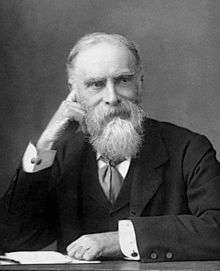
- The Flora of the Island of Aran, 1859
- The Holy Roman Empire, 1864
- Report on the Condition of Education in Lancashire, 1867
- The Trade Marks Registration Act, with Introduction and Notes on Trade Mark Law, 1877
- Transcaucasia and Ararat, 1877
- The American Commonwealth, 1888,[41] volume I, volume II, volume III
- Impressions of South Africa, 1897
- Studies in History and Jurisprudence, 1901, volume I, volume II
- Studies in Contemporary Biography, 1903
- The Hindrances to Good Citizenship, 1909 Reissued by Transaction Publishers, 1993, edited and with a new Introduction by Howard G. Schneiderman
- South America: Observations and Impressions 1912
- University and Historical Addresses: Delivered During a Residence in the United States as Ambassador of Great Britain. New York: Macmillan. 1913. Retrieved 12 March 2019 – via Internet Archive.
- The Treatment of Armenians in the Ottoman Empire 1915–16, 1916
- Essays and Addresses in War Time, 1918
- Modern Democracies, 1921 volume I, volume II
His Studies in History and Jurisprudence (1901) and Studies in Contemporary Biography (1903) were republications of essays.
Selected articles
- "The Future of English Universities," The Fortnightly Review, Vol. XXXIX, 1883.
- "An Ideal University," The Contemporary Review, Vol. XLV, June 1884.
- "The Relations of History and Geography," The Contemporary Review, Vol. XLIX, January/June 1886.
- "An Age of Discontent," The Contemporary Review, Vol. LIX, January 1891.
- "The Migrations of the Races of Men Considered Historically," The Contemporary Review, Vol. LXII, July 1892.
- "The Teaching of Civic Duty," Educational Review, Vol. VI, 1893.
- "Equality," The Century; A Popular Quarterly, Vol. LVI, No. 3, July 1898.
- "What is Progress?," The Atlantic Monthly, Vol. C, 1907.
Famous quotations
- "Patriotism consists not in waving the flag, but in striving that our country shall be righteous as well as strong."
- "No government demands so much from the citizen as Democracy and none gives back so much."
- "Life is too short for reading inferior books."
References
- "BRYCE, JAMES (1838- )". The Encyclopaedia Britannica; A Dictionary of Arts, Sciences, Literature and General Information. IV (BISHARIN to CALGARY) (11th ed.). Cambridge, England: At the University Press. 1910. p. 699. Retrieved 12 March 2019 – via Internet Archive.
- "James Bryce, 1st and last Viscount Bryce". The Peerage. Retrieved 6 October 2016.
- Fisher, H. A. L. (1927) James Bryce: Viscount Bryce of Dechmont, O.M., Vol. 2, London resp. New York. p. 13
- Robbins, Keith G. (1967). "Lord Bryce and the First World War". The Historical Journal. 10 (2): 255–278. doi:10.1017/S0018246X00027473.
- James Bryce
- Pollock, Frederick (April 1922). "James Bryce". The Quarterly Review. 237: 400–414.
- "No. 27995". The London Gazette. 15 February 1907. p. 1066.
- "No. 26319". The London Gazette. 23 August 1892. p. 4801.
- "No. 26318". The London Gazette. 19 August 1892. p. 4742.
- "No. 26518". The London Gazette. 1 June 1894. p. 3181.
- Harvie, Christopher. "James Bryce, 1st Viscount Bryce (1838–1922)". Oxford Dictionary of National Biography. Oxford University Press. Retrieved 3 January 2014.
- Seaman, John T. (2006). A Citizen of the World: The Life of James Bryce. I. B. Tauris. p. 208. ISBN 9781845111267. Retrieved 21 May 2016.
- "No. 27995". The London Gazette. 15 February 1907. p. 1065.
- Bryce, Viscount James. "Chapter CXI: Equality". The American Commonwealth. III. p. 745.
- Viscount James Bryce Bryce, The American Commonwealth, p. 746
- Prochaska, Frank (2012). Eminent Victorians on American Democracy: The View from Albion. Oxford: Oxford University Press. pp. 97–98, 102. ISBN 978-0-19-965379-9.
- Kirkwood, Patrick M. (2014). "'Michigan Men' in the Philippines and the Limits of Self-Determination in the Progressive Era". Michigan Historical Review. 40 (2): 63–86 [p. 80]. doi:10.5342/michhistrevi.40.2.0063.
- "No. 28797". The London Gazette. 30 January 1914. p. 810.
- Travis, Hannibal. "Genocide in the Middle East: The Ottoman Empire, Iraq, and Sudan." Durham, NC: Carolina Academic Press, 2010, 2007, pp. 237–77, 293–294.
- Travis, Hannibal. "'Native Christians Massacred': The Ottoman Genocide of the Assyrians During World War I Archived 16 July 2012 at Archive.today." Genocide Studies and Prevention, Vol. 1, No. 3, December 2006, pp. 327–371. Retrieved 2 February 2010.
- "Court Circular". The Times (36570). London. 26 September 1901.
- "University intelligence". The Times (36906). London. 23 October 1902. p. 9.
- "Fellows 1660–2007" (PDF). Royal Society. Retrieved 6 October 2016.
- On Bryce′s engagement with the Armenian question before the genocide, see Oded Steinberg, James Bryce and the Origins of the Armenian Question, Journal of Levantine Studies 5, No 2 (Winter 2015), p. 13–33.
- "General Correspondence – Meeting at National Liberal Club – 1914. Ref No. Dell/2/3. British Library of Political and Economical Science". British Library (of Economical and Political Science). Retrieved 14 January 2014.
- "James Bryce, 1st Viscount Bryce". Oxford Dictionary of National Biography. Oxford University Press Pty. Ltd. Retrieved 12 January 2014.
- American Antiquarian Society Members Directory
- "No. 27994". The London Gazette (Supplement). 12 February 1907. p. 963.
- Lord Bryce, Viscount James (8 May 1910). "Telegram British Embassy, Washington" (PDF). Telegram British Embassy, Washington. Retrieved 29 November 2015.
- Rayner, Gordon (21 June 2013). "How the family of 'commoner' Kate Middleton has been rubbing shoulders with royalty for a century". UK Daily Telegraph. Retrieved 31 October 2016.
regarded Lord Bryce as an old friend and trusted counsellor to whom I could always turn.”
- New York Times (28 January 1922). "Britain offers American President Bust of Lord Bryce" (PDF). New York Times. New York Times. Retrieved 23 May 2013.
- Martin, Stanley (21 December 2006). One Hundred Years of Matchless Honour – The Order of Merit. I.B.Tauris. p. 315. ISBN 9781860648489.
- "No. 27994". The London Gazette. 12 February 1907. p. 963.
- http://www.apsanet.org/ABOUT/Leadership-Governance/APSA-Presidents-1903-to-Present
- Burke's Genealogical and Heraldic History of Peerage, Baronetage and Knightage, Volume 1. Burke's Peerage Ltd. 1937.
- The Complete Peerage, Volume XIII – Peerage Creations 1901–1938. St Catherine's Press. 1949. p. 187.
- Burke, Sir John (1937). Genealogical and Heraldic History of the Landed Gentry: Founded by the Late Sir Bernard Burke, Volume 1. Shaw. Retrieved 30 March 2020.
- "The London Gazette". Tho. Newcomb over against Baynards Castle in Thamse-street. 1922: 5832. Retrieved 30 March 2020. Cite journal requires
|journal=(help) - Reed, Michael (5 April 2013). "Duchess of Cambridge not posh? Her ancestor was lord mayor of Leeds". The Guardian. Retrieved 30 March 2020.
- Jalland, P. (1996). Death in the Victorian Family. Oxford University Press. pp. 148, 404, 457. ISBN 9780198208327.
Frances Lupton to Marion Bryce, 26th December 1891...
- "Review of The American Commonwealth by James Bryce". The Quarterly Review. 169: 253–286. July 1889.

Further reading
- Seaman, John T. Jr. (2006). A Citizen of the World: The Life of James Bryce. London/New York. ISBN 978-1-84511-126-7.
- Steinberg, Oded Y. "The Confirmation of the Worst Fears: James Bryce, British Diplomacy and the Armenian Massacres of 1894-1896". Études Arméniennes Contemporaines. pp. 15–39. doi:10.4000/eac.1913.
External links
| Wikimedia Commons has media related to James Bryce, 1st Viscount Bryce. |
| Wikisource has the text of the 1911 Encyclopædia Britannica article Bryce, James. |
| Wikisource has original works written by or about: James Bryce, 1st Viscount Bryce |
| Wikiquote has quotations related to: James Bryce, 1st Viscount Bryce |
- Portraits of James Bryce, 1st Viscount Bryce at the National Portrait Gallery, London

- Works by James Bryce, 1st Viscount Bryce at Project Gutenberg
- Works by or about James Bryce, 1st Viscount Bryce at Internet Archive
- Works by James Bryce, 1st Viscount Bryce at LibriVox (public domain audiobooks)

- Hansard 1803–2005: contributions in Parliament by James Bryce
- James Bryce, Two Historical Studies: The Ancient Roman Empire and the British Empire in India; Diffusion of Roman and English Law Throughout the World (1914)
- Text of the Bryce report on German atrocities
- Viscount James Bryce at The Online Library of Liberty
- James Bryce, preface to Shall This Nation Die?, by Joseph Naayem, New York: 1921, quoted in Native Christians Massacred, The Ottoman Genocide of the Assyrians during World War I, 1.3 Genocide Studies and Prevention: An International Journal 326 (2006)
- Atrocities Cured Pacifist, The New York Times, 20 April 1918, at 11
- The American Commonwealth, with an Introduction by Gary L. McDowell (Indianapolis: Liberty Fund, 1995). 2 Vols. See original text in The Online Library of Liberty.
- Newspaper clippings about James Bryce, 1st Viscount Bryce in the 20th Century Press Archives of the ZBW
| Parliament of the United Kingdom | ||
|---|---|---|
| Preceded by Joseph d'Aguilar Samuda |
Member of Parliament for Tower Hamlets 1880–1885 |
Constituency abolished |
| New constituency | Member of Parliament for Aberdeen South 1885–1907 |
Succeeded by George Esslemont |
| Political offices | ||
| Preceded by Hon. Robert Bourke |
Under-Secretary of State for Foreign Affairs 1886 |
Succeeded by Sir James Fergusson, Bt |
| Preceded by The Duke of Rutland |
Chancellor of the Duchy of Lancaster 1892–1894 |
Succeeded by The Lord Tweedmouth |
| Preceded by A. J. Mundella |
President of the Board of Trade 1894–1895 |
Succeeded by Charles Thomson Ritchie |
| Preceded by Walter Long |
Chief Secretary for Ireland 1905–1907 |
Succeeded by Augustine Birrell |
| Diplomatic posts | ||
| Preceded by Sir Henry Mortimer Durand |
British Ambassador to the United States 1907–1913 |
Succeeded by Sir Cecil Spring Rice |
| Peerage of the United Kingdom | ||
| New creation | Viscount Bryce 1914–1922 |
Extinct |